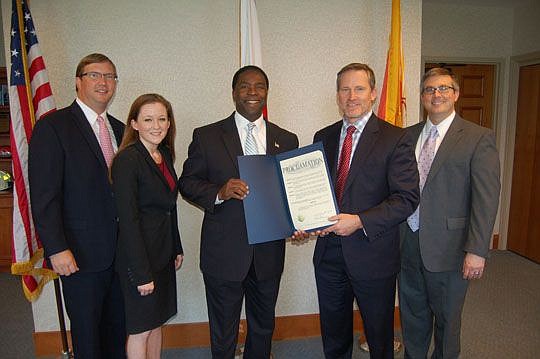
The keynote speaker at The Jacksonville Bar Association’s Law Day luncheon Wednesday covered legal history and tradition from the 800-year-old Magna Carta to the Internet and smartphones.
William Hubbard, president of The American Bar Association, said the Magna Carta is the basis of the most fundamental concepts of government and law.
It was the inspiration for the Declaration of Independence, U.S. Constitution and Bill of Rights.
More than 175 opinions handed down by the U.S. Supreme Court cited the Magna Carta, he said.
Issued in 1215 by King John of England and amended 10 years later by King Henry III, the document established for the first time that everyone, even the king, was subject to the law.
“It has stood the test of time for 800 years because it created a government of law, not of men,” Hubbard said of the document also known as “The Great Charter."
The national association will commemorate the 800th anniversary of the Magna Carta in June.
Hubbard also talked about the civil justice gap in America, where 80 percent of the population is low- or moderate-income and often unable to afford civil legal representation beyond the most basic needs.
In 85 percent of family court cases, one or both parties appears without representation and about half of applicants for legal aid are turned down due to lack of enough attorneys to represent them.
Lack of access creates a lack of trust, which can escalate and contribute to situations such as those that recently occurred in Baltimore and in Ferguson, Mo.
“When trust is broken, the rule of law is threatened,” said Hubbard. “That can lead to violence.”
When he became president of the association last year, Hubbard established the ABA Commission on the Future of Legal Services, which will make recommendations on how technology and innovation can help expand legal services to the poor and middle class.
“We cannot accept the status quo,” Hubbard said. “We have to open our minds and leverage technology to develop new means to deliver legal services.”
Many tools to access what used to be done exclusively by attorneys now are available on the Internet, parking tickets can be viewed and paid on a smartphone and lawyers are opening virtual offices.
Hubbard said venture capitalists in 2014 invested more than $1 billion in startup companies that deliver legal services, but they aren’t law firms, they are tech companies.
“We need to embrace these changes,” said Hubbard. “We should not leave it to others to decide our future. We must engage in fresh thinking and devise new ways to provide legal services.”
@DRMaxDowntown
(904) 356-2466